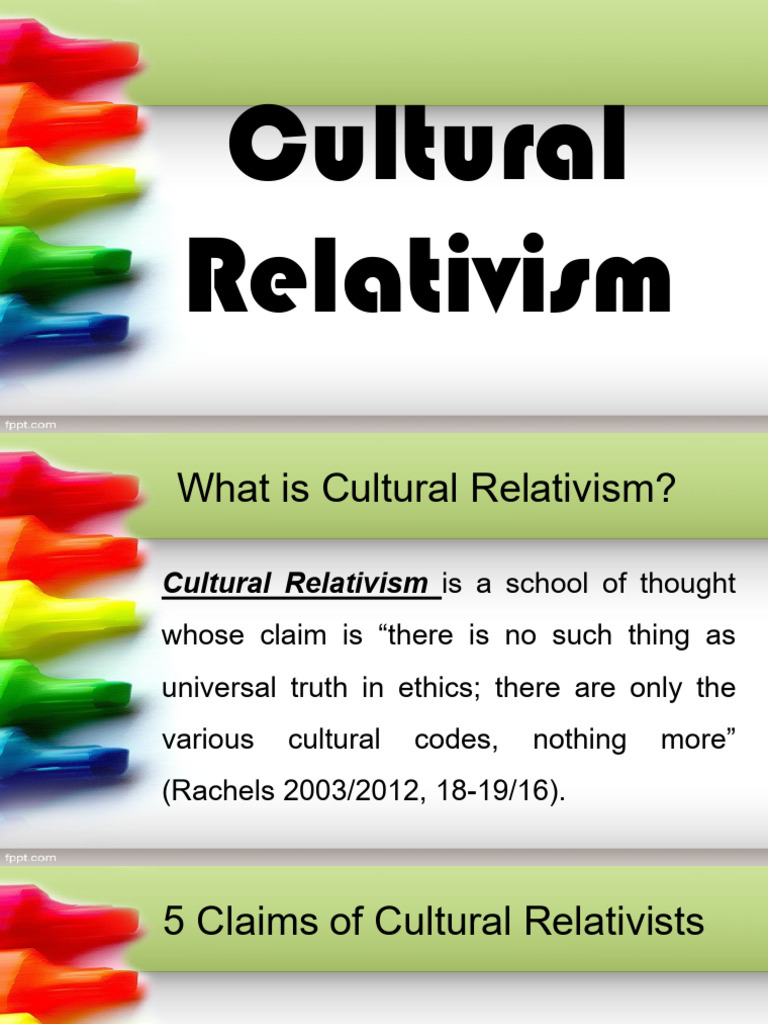The tenets of cultural relativism offer an intriguing lens through which to examine the multifaceted tapestry of human morality and ethics. At its core, cultural relativism posits that a person’s beliefs, practices, and values are inherently shaped by their cultural context. This philosophical stance raises a plethora of questions while simultaneously challenging the notion of objective morality. What do cultural relativists claim, and how do these claims impact our understanding of right and wrong?
Cultural relativists assert that moral codes and ethical norms are not universal but are instead products of specific cultural environments. In essence, they contend that beliefs about what is morally acceptable vary dramatically between societies. For instance, practices deemed acceptable in one culture may be viewed as unethical in another. This divergence is not merely a superficial observation; it underscores a fundamental aspect of human existence — that cultures are unique, shaped by history, geography, and social dynamics. Thus, cultural relativism encourages the appreciation of diverse moral frameworks rather than enforcing a monolithic standard.
One salient claim made by cultural relativists is that attempts to impose one culture’s moral system upon another are inherently ethnocentric. Ethnocentrism involves evaluating other cultures against the standards of one’s own, often leading to misunderstandings and cultural imperialism. For instance, consider the controversy surrounding practices like polygamy or female genital mutilation, which elicit starkly contrasting reactions across different societies. Cultural relativists argue that to condemn such practices solely through a Western moral lens risks stripping these cultural practices of their intrinsic meaning and significance.
However, cultural relativism is not without its challenges and limitations. Does this stance imply that anything goes, regardless of the potential harm caused to individuals? For instance, can we ethically accept practices that might infringe upon basic human rights — such as oppressive traditions or brutal punishments — simply because they are rooted in a particular culture? This quandary poses an uncomfortable question: should moral relativism remain unchallenged, or is it necessary to establish some form of universal human rights that transcends cultural boundaries?
Further complicating the discourse around cultural relativism is the intersection of globalization and moral evolution. As societies become increasingly interconnected, cultural exchange prompts a reassessment of traditional values. The diffusion of ideas through technology and travel questions the static nature of cultural practices. How do cultural relativists reconcile their claims with the reality that exposure to diverse ideologies often leads to evolving moral standards? It suggests a dynamic interplay between cultural relativism and anthropological evolution, wherein cultures adapt and assimilate ideas from one another.
Cultural relativism also raises engaging philosophical queries regarding moral progress. Can there be a standard by which we judge moral advancement? For example, movements advocating for gender equality and LGBTQ+ rights challenge countries where such rights are staunchly opposed. Is it fair to argue that a society which embraces such progressive values is inherently superior to one that adheres to outdated traditions? This is a delicate topic that invites a multiplicity of interpretations. Here, cultural relativists might argue that such evolution is a natural consequence of cultural negotiation rather than a hierarchical imposition of values.
Moreover, cultural relativists emphasize understanding over judgment. They champion the idea that engaging with different worldviews fosters empathy and reduces conflict. When individuals endeavor to understand practices within their cultural contexts, a richer dialogue emerges. This advocacy for dialogue over condemnation holds profound implications for resolving global issues, such as climate change, where collective action across cultures is imperative.
Yet, the advocacy of cultural relativism evokes another question: In the face of environmental degradation and climate crises, do we face an ethical obligation to prioritize global consequences over potentially divergent cultural practices? The urgency of climate action requires cooperation on a global scale, which may necessitate overriding local customs that contribute to ecological destruction. Herein lies a significant conundrum: Can cultural relativism withstand the exigencies of environmental imperatives without being deemed complicit in ecological damage?
The interplay between cultural relativism and environmental issues invites a richer reflection on the concept of sustainable practices. It encourages a dialogue that sensitively navigates cultural beliefs while prioritizing the planet’s health. In pursuing collective environmental goals, can cultural relativists find common ground that respects cultural diversity without sacrificing global ecological standards? This is a fascinating domain ripe for exploration.
In conclusion, cultural relativism offers profound insights into the nature of morality, prompting us to consider the implications of cultural context on our value systems. It champions the importance of understanding and respecting diverse perspectives while also inviting critical reflection on the potential need for universal ethical standards. As humanity faces pressing global challenges—particularly in relation to environmental sustainability—this philosophical approach will undoubtedly continue to provoke lively discourse. It raises essential questions about how we navigate the intersection of cultural beliefs and universally shared responsibilities. Ultimately, how we respond to these inquiries may define our collective future.
